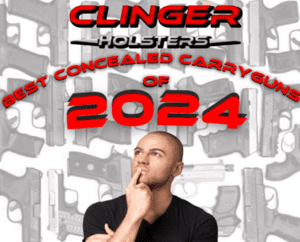
6 Tips for Buying Your First Gun
Are you a novice shooter and are buying your first gun soon? Congratulations! You are in luck, as Clinger Holsters has compiled some considerations, tips, and tricks as you search for your perfect fit for your gun holsters.
Why do you need it?
Why do you need a handgun? Concealed carry or home defense?
If you’re buying your first gun for concealed carry, you want it to be smaller, lighter, and less obtrusive.
If you’re buying your first gun for home defense, you may want something larger and heavier.
So… before you start shopping, figure out what you will use it for.
Now that you know the gun’s primary function, let’s look at styles.
Buying Your First Gun Step #1. What type of handgun style do you want?
There are two types of handgun styles used for personal defense. You need to choose which one is best for you.
- Semi-Automatic Pistol.
- Semi-automatics are the most popular type of handgun in today’s market
- Generally, a lighter, more consistent trigger pull than revolvers
- Capable of holding up to 20 rounds of ammo
- Fast reloads
- Slimmer than revolvers
- Revolver
- Has a revolving cylinder can be easier for people who can’t easily rack a slide
- Usually holds 5 or 6 rounds
- Manual charging/cocking of the hammer
- Double Action triggers are almost always used on self-defense weapons
Buying Your First Gun Step #2. Check your budget
I want you to read this next sentence very carefully. It could save your life and your wallet.
DON’T LET YOUR BUDGET BE THE DECIDING FACTOR WHEN PURCHASING A HANDGUN!
When purchasing a handgun, you must be methodical, precise, and cautious. Especially if you are looking to buy it used.
In the case of firearms – like some other things, cheap is not always the best thing.
If you purchase a firearm used and it has any kind of faults or issues, you are likely to invest more in the weapon, than you had if you would have bought new from the start.
Have an experienced gunsmith look over every part of the weapon any time you consider buying a used firearm.
Buying Your First Gun Step #3. Research handgun factors
Tip #1. Consider caliber size
There are a few popular calibers to choose from. The .45acp, 9mm, & 40S&W are the most popular for semi-autos. The .38 & .357 are most popular for revolvers. The size of the round, or caliber can determine how much recoil the gun will have and how effective the stopping power might be.
Tip #2. Think about recoil
A very common myth is that if I buy a small gun it will have less recoil- actually the case is quite the opposite. Since a smaller weapon is [smaller] it has less mass to absorb the recoil of the weapon.
So a large weapon with a smaller caliber (e.g. Beretta M9) has much less felt the recoil, whereas a small weapon with a larger caliber (e.g. Xds 45acp) has more aggressive recoil.
Tip #3. How much stopping power do you need?
Obviously, as caliber sizes go up- the effectiveness of the stopping power will increase. A .22 caliber round will not be as effective at stopping an assailant as a .44.
Tip #4. Compare firepowers
Full-size guns chambered in 9mm can hold as many as 18 rounds vs a similar gun chambered in 45acp which holds 10-12 rounds.
Usually, guns chambered in 45acp can’t hold as many rounds as a gun chambered in 9mm. Therefore, firepower should be considered as well.
Buying Your First Gun Step #4. Test out a few handguns
There are two very important things to remember when buying a handgun
Tip #5. How does it feel?
- Is the gun comfortable in your hand?
- Can you easily reach all the controls?
- Does it point naturally?
- Does it cup to your palm appropriately?
Tip #6. How does it shoot?
If at all possible try and test the gun.
- Some gun shops have ranges.
- Some ranges will let you rent and test the guns they have on hand.
So remember to evaluate the gun’s purpose before your purchase.
Also, remember this:
There is no perfect gun for all situations.
You will be better suited with at least 2-3 different gun sizes for different situations. Obviously, smaller guns are easier to conceal and bigger guns are easier to shoot. For some reason, if you don’t have to conceal it, the bigger gun will probably suit your needs better.
If you plan on concealing your new weapon, here is a breakdown of the best concealed carry guns on the market.
If you have any more questions about being a concealed carrier, check out our in-depth article here! and also checkout our Glock 23 holsters here





